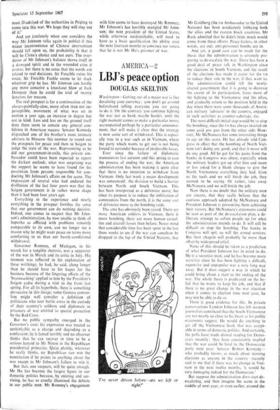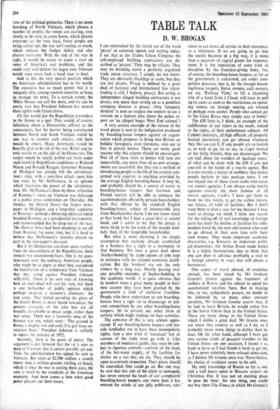LBJ's peace option
AMERICA-2 DOUGLAS SKELTON
Washington—Getting out of a major war is like devaluing your currency: you don't go around beforehand telling everyone you are going to do it. On the contrary you continue fighting the war just as hard, maybe harder, until the right moment comes to make a particular move, accompanied perhaps by a particular announce- ment, that will make it clear that the strategy is now some sort of withdrawal. This is especi- ally true in a war such as in Vietnam, where the party which wants to get out is not being forced to surrender because of intolerable losses.
Ever since the failure of diplomatic manoeuvres last autumn and this spring to ease the process of ending the war, the American administration has been making it quite clear that there is no intention to withdraw from Vietnam. Only last week a major development was announced: the decision to build a barrier between North and South Vietnam. This has been interpreted as a defensive move, but since its purpose is to reduce the infiltration of communists from the north, it is the same sort of defensive move as the bombing raids.
The ante has obviously been raised. There are more American soldiers in Vietnam, there is more bombing, there are more human casual- ties and aircraft losses than before. Never mind that considerable time has been spent in the last three weeks to see if the war can somehow be dropped in the lap of the United Nations, that
'I've never driven before—are we left or right?'
Mr Goldberg (the us Ambassador to the United Nations) has been assiduously lobbying both the allies and the eastern block countries. Mr Rusk admitted that he didn't think much would come from these efforts. Peace-feelers, in other words, are out; anti-personnel bombs are in.
And yet, a good case can be made for the thesis that the administration is seriously pre- paring to de-escalate the war. There has been a good deal of peace talk in Washington since the elections in South Vietnam, and the result of the elections has made it easier for the us to reduce their role in the war, if they want to. The administration could tell the newly- elected government that it is going to decrease the extent of its participation, leave more of the fighting to the Vietnamese and the allies, and gradually return to the position held in the day when there were some thousands of Ameri- can military 'advisers' in the country, engaged in such activities as counter-sabotage, etc.
The most difficult initial step would be to stop the bombing, since the us has always insisted on some quid pro quo from the other side. How- ever, Mr McNamara has some interesting things to say on this score. He has already told Con- gress in effect that the bombing of North Viet- nam isn't doing any good, and that it never will do any good. All he got for his pains from the hawks in Congress was abuse, especially when the military leaders got up after him and more or less asked for a blank cheque to give the' North Vietnamese everything they had. Give us the tools and we will finish the job, they seemed to be saying. Or rather, take away McNamara and we will finish the job.
Now there is no doubt that the military men arc sincere, that they really believe that the cautious approach adopted by McNamara and President Johnson is preventing them achieving their victory. But McNamara's statements could be seen as part of the de-escalation plan, a de- liberate attempt to soften people up for what the administration intends to do. It will still be difficult to stop the bombing. The hawks in Congress will spit, so will the armed services. But their chagrin will probably be more than offset by widespread relief.
None of this should be taken as a prediction of what President Johnson has in mind to do. He is a secretive man, and he has become more secretive since he has been fighting a difficult, expensive and unpopular war a very long way away. But it does suggest a way in which he could bring about a start to the ending of the war. The whole thesis is predicated on the be- lief that he wants to keep his job, and that if there is no great change in the war situation when it comes to election time next year, he may not be able to do so.
There is good evidence for this. In private conversations Lyndon Johnson has left western journalists convinced that the South Vietnamese are not nearly so close to his heart as his public statements suggest. He would do anything to get off the Vietnamese hook that was accept- able in terms of domestic politics. And certainly, the polls have made dismal reading for Demo-
crats recently: they have consistently implied that the war could be fatal to the Democratic party next year. Senator Robert Kennedy—
who probably knows as much about winning elections as anyone in the country- recently said to me that if there was no change in Viet- nam in the next twelve months, 'it would be very damaging indeed for the Democrats.'
But suppose the administration does start de- escalating, and then imagine the scene in the middle of next year, or even earlier, around the
time of the political primaries. There is no more bombing of North Vietnam, which pleases a number of people; the troops are starting, very slowly to be sure, to come home, which pleases everyone (at the very least, fewer people are being called up); the war isn't costing so much, which reduces the budget deficit and also pleases everyone. With the end of the war in sight, it would be easier to. make a start on some of America's real problems, and this could very well deliver the negro vote. Johnson would once more look a bard man to beat.
Add to this the very special position which an American administration has in the world.
The executive has so much power that it is uniquely able, among western countries at least, to manage the news. To a certain extent, the
White House can call the shots, and we can be pretty sure that President Johnson has several shots up his wide Texan sleeve.
All this would put the Republican pretenders to the throne in a spot. They would, of course,
fulminate about a Democratic sell-out to the communists, but the barrier being constructed between North and South Vietnam would be
one way to counter such attacks, and there
would be others. Many Americans would be heartily glad to be rid of the war. Relief and in- ertia would be on the side of the Democrats. The carpet would be totally pulled out from under such hawkish Republican candidates as Richard Nixon and Ronald Reagan. Governor Romney of Michigan has already felt the administra- tion's sting, with a merciless attack upon him last week by Mr McNamara, in an episode which illustrates the power of the administra- tion. Mr. McNamara's blow-by-blow refutation
of Romney's views on Vietnam was delivered at a public press conference on Thursday. On
Sunday, the Detroit News—the largest news- paper in Michigan, and a long-time supporter of Romney—printed a blistering editorial which branded Romney as a presidential incompetent,
and recommended that he drop out of the race. The Detroit News bad been planning to cut off
from Romney for some time, but it is hard to believe that McNamara's remarks played no part in the newspaper's decision.
But if the Democrats can draw some comfort from the discomfiture of the Republicans, there remain two unanswered fears. One is the ques- tion-mark over the ordinary American people, who might be so angry at what they considered the humiliation of a withdrawal from Vietnam that they voted against President Johnson willy-nilly. There is no sure way of knowing
hew an individual will cast his vote, but there is one bellwether of public opinion which perhaps deserves a moment's attention: the , pop songs. That ballad parading the glory of the Green Berets is never heard nowadays; the present creatures of the juke box are all broadly classifiable as peace songs, rather than
war songs. There was a favourite song of the Korean war era, which went: 'The ground in Korea is mighty wet and cold, I've got those ro- rotation blues.' President Johnson is unlikery to repeat the mistake of 1952.
Secondly, there is the game of poker. The argument is put forward that the us is now so deep in Vietnam that it cannot possibly get out.
True, the administration has upped the ante in Vietnam. But even at $2,500 million a month (more than a million pounds sterling an hour), which is what the war is costing these days, the ante is small by the standards of the American economy. And there comes a time when good poker players cut their losses.































 Previous page
Previous page